One of those four appropriations will be a critical defense spending bill, which equates to 60% to 65% of the total annual budget. That defense bill, with 184 amendments to consider, will take some time to debate.
In a nod to determined Freedom Caucus conservatives, McCarthy is expected to bring the four bills to the floor under one set of rules but they will be heard individually – not in one massive presentation with little or no discussion. But getting to the continuing resolution, or CR, won’t be easy.
Rep. Matt Gaetz (R-Florida) told NewsNation Monday night his refusal to support a short-term funding plan is about a fight to change the budgeting process.
“We need single subject spending bills," Gaetz said. "We need to negotiate those in a bipartisan way in divided government in order to get them into law, but that will ensure that we have at least a fair paradigm in which to put downward pressure on spending."
 “A lot of members, and rightly so, have been concerned about the fact that we've not been bringing individual appropriations to the bills to the floor the last several years,” Rep. Robert Aderholt (R-Alabama), a House Appropriations Committee member, said on the Washington Watch program Monday. “No one wants to see them lumped them together, and so this is a way to call the hand of the leadership and say, ‘We need to move forward on these bills individually as opposed to just all of them in block.’”
“A lot of members, and rightly so, have been concerned about the fact that we've not been bringing individual appropriations to the bills to the floor the last several years,” Rep. Robert Aderholt (R-Alabama), a House Appropriations Committee member, said on the Washington Watch program Monday. “No one wants to see them lumped them together, and so this is a way to call the hand of the leadership and say, ‘We need to move forward on these bills individually as opposed to just all of them in block.’”
The singular approach means the House will not present a budget to the Senate in time to avoid a partial government shutdown with Saturday’s deadline looming. That means panicky news headlines could claim government services are being threatened by in-fighting among the GOP.
Aderholt told show host Tony Perkins that the four-bill approach shows McCarthy’s commitment to having the bills discussed individually – even with as many as 400 amendments expected to be attached to these four bills along the way.
Aderholt says he would be in favor of a short-term – a really short-term – extension.
 “If we do move on these four appropriation bills this week, and the Speaker brings those to the floor, regardless of what happens, then I think that that will go a long way toward trying to at least get a five-day CR to just allow us to pass a few more,” he said.
“If we do move on these four appropriation bills this week, and the Speaker brings those to the floor, regardless of what happens, then I think that that will go a long way toward trying to at least get a five-day CR to just allow us to pass a few more,” he said.
Aderholt said he’d be willing to go as long as seven days with the CR.
“I really am concerned about doing over a month CR because I think everybody would say, ‘We've got plenty of time, and so we'll just kick the can down the road.’ I would be in favor of doing a seven-day CR to let us just work for the next seven days and get more individual bills passed,” he said.
Aderholt said he’s confident in the House’s commitment to get the work done.
House research shows that deficits in the FY 2023 budget of $1.6 trillion are the highest sustained level of debt in American history.
“There’s no question that will take a lot of time, but I think members are very committed to getting in there and doing what it takes to get those individual appropriation bills passed," Aderholt observed. "I understand that a lot of my colleagues are frustrated. When you’re spending more money than you’re taking in, bad things are going to happen. We’ve got to get a handle on this."







